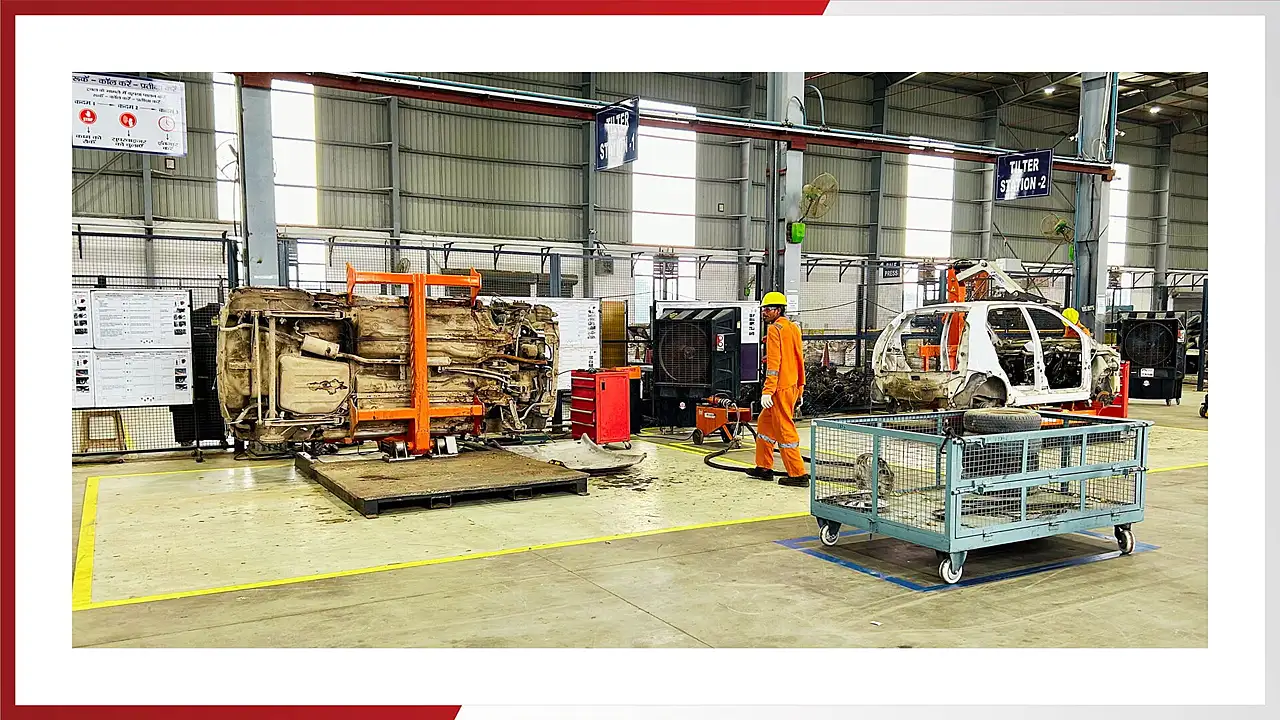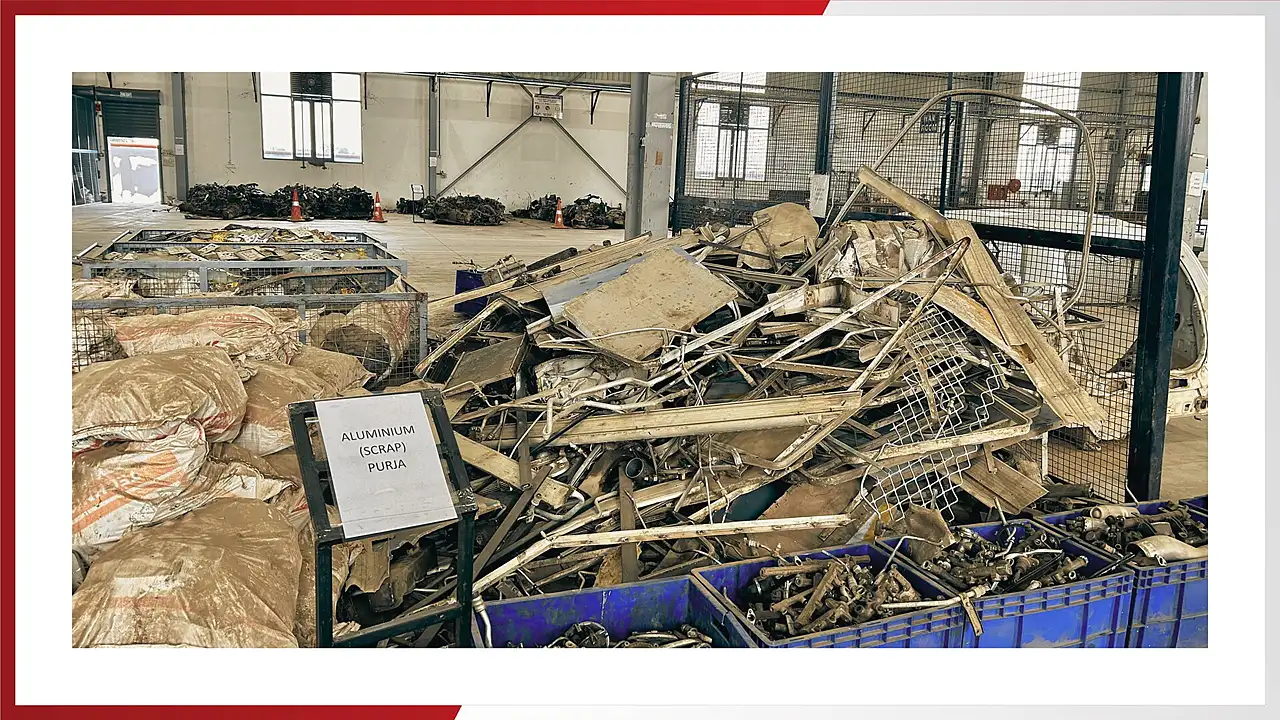
Long before the scrappage policy was implemented, the unorganised sector was already dismantling vehicles in the country. But that is not ELV management, sustainable or safe; this was mostly the salvage of parts to be re-sold and utilise whatever got left behind. The need for an organised ELV sector is critical for a circular economy and also for the environment.
Rosmerta Group and a few others have a systematic method of recycling vehicles, which is the need of the hour. We visited Rosmerta's largest scrapping facility in Manesar to get an in-depth view of the vehicle recycling process.
Rosmerta has a presence across the nation and serves over 150 million customers. The group's operations span various sectors, including high-security registration plates, intelligent transport management systems, automated testing stations, and vehicle recycling.
Kartick Nagpal, President of Rosmerta Group, recently shared insights into the company's journey, the current landscape of vehicle scrapping in India, and the challenges and opportunities ahead.
Vehicle Scrapping
Vehicle scrapping, or end-of-life vehicle (ELV) management, is a relatively new but crucial industry in India, aimed at phasing out old, unfit, and polluting vehicles. Rosmerta has been a key player in this sector, operating state-of-the-art registered vehicle scrapping facilities (RVSFs). These facilities comply with international standards, ensuring eco-friendly dismantling and disposal of vehicles. Starting from a preliminary check for radioactivity and CNG cylinder removal, the vehicle has its fluids removed, then all the body parts, the engine and driving gear, the plastics, electrics, and finally, the shell gets crushed into a cube as metal salvage.
Nagpal emphasised the importance of recycling in the automotive industry, aligning with global trends towards a circular economy. He highlighted the environmental and economic benefits of vehicle scrapping, which not only reduces pollution but also recycles valuable materials back into the manufacturing process, thus conserving resources.
Industry Challenges
Despite the potential benefits, the vehicle scrapping industry in India faces several challenges. One major issue is the lack of uniform implementation of scrappage policies across States. Different States have varying rules and incentives, leading to a fragmented approach that hinders the industry's growth.
Nagpal pointed out that the informal sector, which has been involved in vehicle dismantling for decades, poses a significant challenge. Informal scrapyards often operate without adhering to environmental and safety regulations, undercutting the formal sector. This not only creates unfair competition but also leads to environmental degradation and loss of government revenue.

Another significant challenge is the financial viability of setting up and operating RVSFs. The initial investment is substantial, and with the current low volume of vehicles being scrapped, many facilities are operating at less than 10% capacity.
Way Forward
Despite these challenges, there are considerable opportunities in the vehicle scrapping industry. The Extended Producer Responsibility (EPR) framework, expected to be implemented by FY26, mandates that OEMs take responsibility for the end-of-life management of vehicles they produce. This policy is anticipated to be a game-changer, driving higher volumes of scrapped vehicles and creating a more robust and organised market for vehicle recycling.
Nagpal highlighted the need for innovative financing solutions and strong government support to address the financial barriers. Incentives such as first-loss guarantees for financial institutions (whereby a third party fintech player compensates lenders if the borrower defaults) and lines of credit for EVs can make vehicle scrapping more financially attractive for businesses and consumers.
He also stressed the importance of raising awareness and educating consumers about the benefits of proper vehicle scrapping. Many vehicle owners are unaware of the environmental and economic advantages of scrapping their old vehicles through formal channels. By increasing awareness and providing clear incentives, the industry can encourage more people to opt for formal scrapping services.
Policy Implementation
The government plays a critical role in shaping the future of the vehicle scrapping industry. Uniform policies and strict enforcement are essential to curb the informal sector and promote the growth of formal RVSFs. The Faster Adoption and Manufacturing of Electric Vehicles (FAME) scheme and the Electric Mobility Promotion Scheme (EMPS) have already made significant strides in promoting EVs in India. Similar initiatives are needed to support the vehicle scrapping industry.

Nagpal commended the proactive steps taken by the central government but noted that State governments need to be equally committed to implementing these policies. Effective collaboration between the central and State governments is crucial for the success of the vehicle scrapping initiative.
For example, the R134a Freon gas from the vehicles' HVAC has to be stored in separate cylinders and stored, because there are no regulations in place on how to dispose of this ozone-harmful gas. It just shows that the policies are not keeping up with the need to support the sector at the pace that is required.
Rosmerta's Plans
Looking ahead, Rosmerta Group has ambitious plans to expand its vehicle scrapping operations. The company aims to set up ten new RVSFs across India by FY26-27, strategically located in areas with high vehicle density and favourable policies. The expansion will require hundreds of crore in investment to be done by the company. This expansion is expected to increase the group's capacity to handle a larger volume of scrapped vehicles, positioning Rosmerta as a leader in the sustainable management of end-of-life vehicles.
Nagpal is optimistic about the future of the vehicle scrapping industry in India. He believes that the industry can achieve significant growth with the right policies, financial incentives, and consumer awareness. Rosmerta is committed to playing a pivotal role in this transition, leveraging its expertise and innovative solutions to drive the industry forward.
While the scrapping industry wades through complexities in India, the opportunities are vast, particularly with the anticipated implementation of the EPR framework. The success of this industry will not only contribute to environmental conservation but also drive economic growth, making it a vital component of India's journey towards a sustainable future.